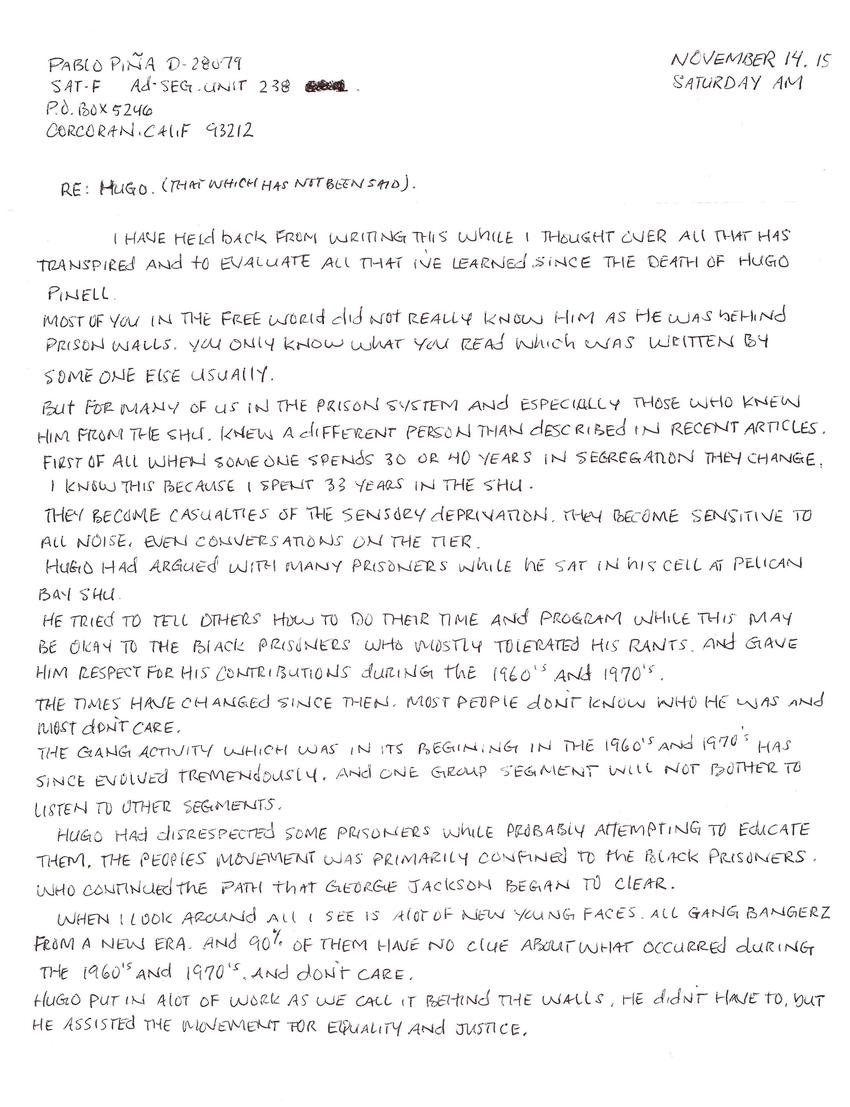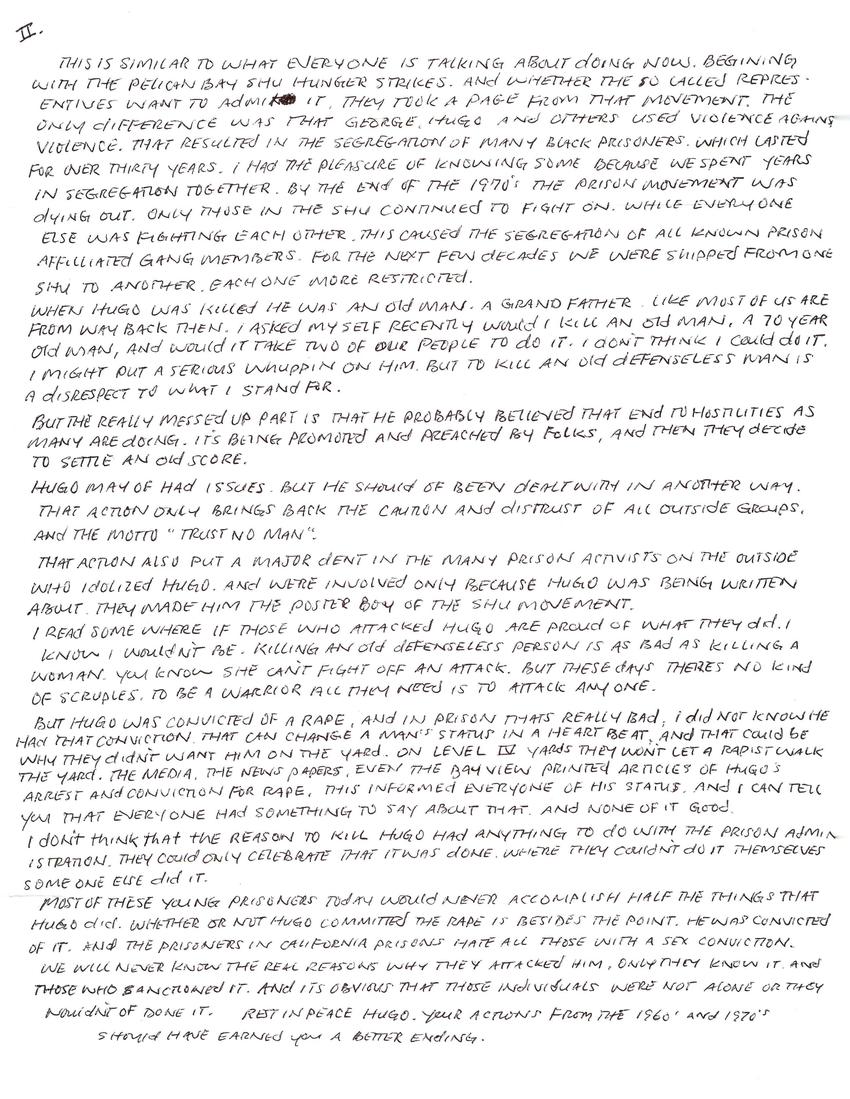
Transcription
November 14, 2015
Saturday AM
Pablo Piña D-28079
SAT-F Ad-Seg-Unit 230
P.O. Box 5246
Corcoran, CA 93212
RE: Hugo (That Which Has Not Been Said)
I have been held back from writing this while I thought over all that has transpired and to evaluate all that I've learned since the death of Hugo Pinell. Most of you in the free world did not really know him as he was behind prison walls. You only know what you read, which was written by someone else usually.
But for many of us in the prison system, and especially those who knew him from the SHU, we knew a different person than described in recent articles.
First of all, when someone spends 30 or 40 years in segregation, they change. I know this because I spent 33 years in SHU. They become casualties of the sensory deprivation. They become sensitive to all noise, even conversations on the tier.
Hugo had argued with many prisoners while he sat in his cell at Pelican Bay SHU. He tried to tell others how to do their time and program. This may have been okay to the black prisoners, who mostly tolerated his rants and gave him respect for his contributions during the 1960s and '70s. The times have changed since then. Most people don't know who he was and most don't care. The gang activity in the 1960s and '70s has since evolved tremendously. One group segment will not bother to listen to other segments.
Hugo disrespected some prisoners while probably attempting to educate them. The People's Movement was primarily confined to the black prisoners who continued the path that George Jackson began to clear.
When I look around, all I see is a lot of new young faces. All gang bangers from a new era. 90% of them have no clue about what occurred during the 1960s and '70s, and don't care.
Hugo put in a "lot of work", as we call it behind the walls. He didn't have to, but he assisted the movement for equality and justice. This is similar to what everyone is talking about doing now, beginning with the Pelican Bay SHU hunger strikes and whether the so-called representatives want to admit it. They took a page from that movement. The only difference was that George, Hugo, and others used violence against violence. That resulted in the segregation of many black prisoners, which has lasted for over thirty years. I had the pleasure of knowing some because we spent years in segregation together.
By the end of the 1970s, the prison movement was dying out. Only those in the SHU continued to fight on while everyone else was fighting each other. This caused the segregation of all known prison affiliated gang members. For the next few decades, we were shipped from one SHU to another, each one more restricted.
When Hugo was killed, he was an old man. A grandfather. Like most of us are from way back then.
I asked myself recently: would I kill an old man, a 70-year-old man, and would it take two of our people to do it? I don't think I could do it. I might put a serious whuppin' on him, but to kill an old defenseless man is a disrespect to what I stand for.
But the really messed up part is that he probably believed that ended hostilities as many are doing. It's being promoted and preached by folks, and then they decide to settle and old score.
Huga may have had issues. But he should have been dealt with in another way. That action only brings back the caution and distrust of all outside groups, and the motto "trust no man." That action also puts a major dent in the many prison activists on the outside who idolized Hugo and were involved only because Hugo was being written about. They made him the poster boy of the SHU movement.
I read somewhere that if those who attacked Hugo are proud of what they did. I know I wouldn't be. Killing an old defenseless person is as bad as killing a woman. You know she can't fight off an attack. But these days there's no kind of scruples. To be a warrior, all they need is to attack anyone.
But Hugo was convicted of rape, and in prison that's really bad. I did not know he had that conviction. That can change a man's status in a heartbeat, and that could be why they didn't want him on the yard. On Level IV yards, they don't let a rapist walk the yard. The media, the newspapers, even the Bay View, printed articles of Hugo's arrest and rape conviction. This informed everyone of his status, and I can tell you that everyone had something to say about that. And none of it was good.
I don't think that the reason to kill Hugo had anything to do with the prison administration. They could only celebrate that it was done. Where they couldn't do it themselves, someone else did it.
Most of these young prisoners today would never accomplish half the things that Hugo did. Whether or not Hugo committed the rape is besides the point. He was convicted of it. And the prisoners in California prisons hate all those with a sex conviction. We will never know the real reasons why they attacked him, only that they knew it and those who sanctioned it. And it's obvious that those individuals were not alone or they wouldn't have done it.
Rest in peace, Hugo. Your actions from the 1960s and '70s should have earned you a better ending.
Other posts by this author
|
2025 dec 28

|
2025 apr 3

|
2025 mar 30

|
2025 mar 13

|
2025 jan 22

|
2024 oct 30

|
More... |



Replies